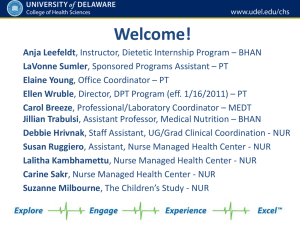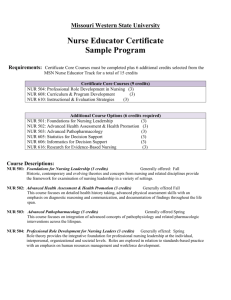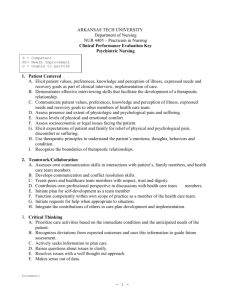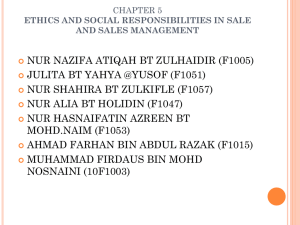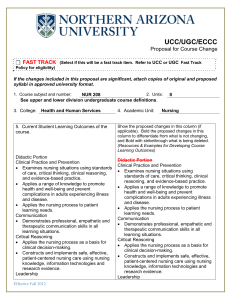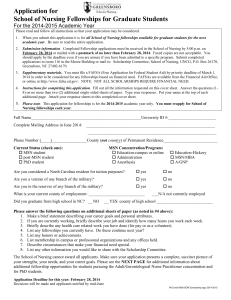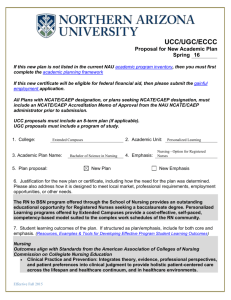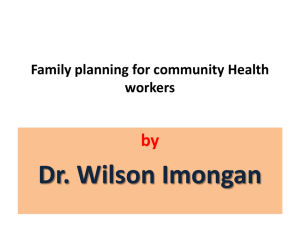(Nurse Practitioner Field) Diploma in
advertisement
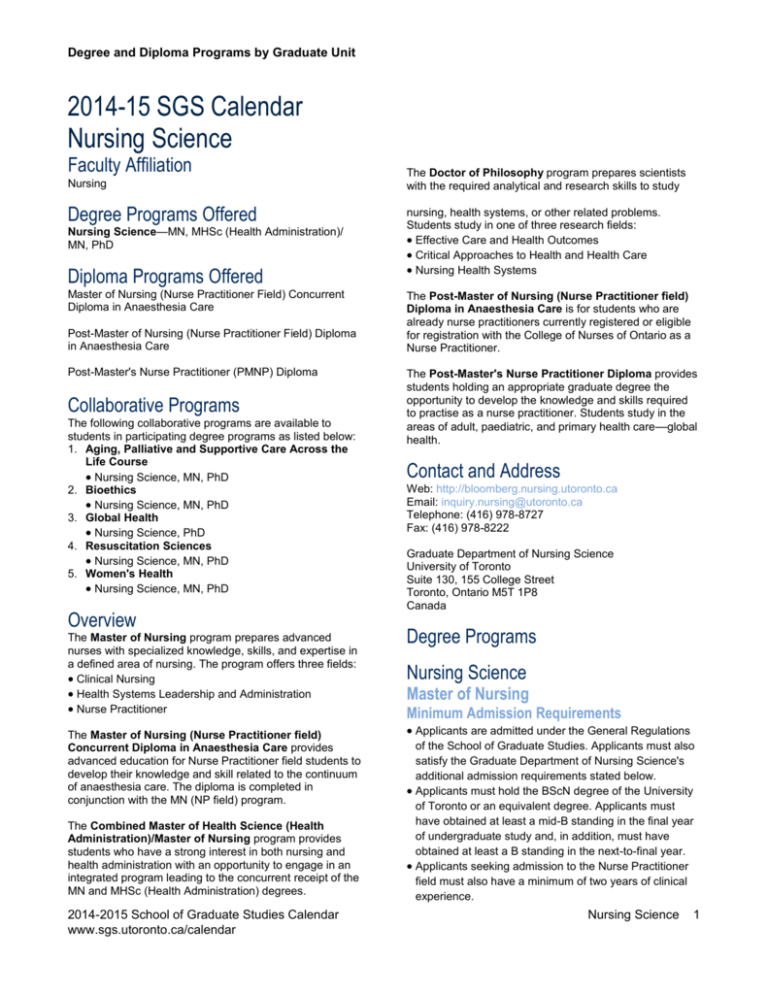
Degree and Diploma Programs by Graduate Unit 2014-15 SGS Calendar Nursing Science Faculty Affiliation Nursing Degree Programs Offered Nursing Science—MN, MHSc (Health Administration)/ MN, PhD Diploma Programs Offered Master of Nursing (Nurse Practitioner Field) Concurrent Diploma in Anaesthesia Care Post-Master of Nursing (Nurse Practitioner Field) Diploma in Anaesthesia Care Post-Master's Nurse Practitioner (PMNP) Diploma Collaborative Programs The following collaborative programs are available to students in participating degree programs as listed below: 1. Aging, Palliative and Supportive Care Across the Life Course Nursing Science, MN, PhD 2. Bioethics Nursing Science, MN, PhD 3. Global Health Nursing Science, PhD 4. Resuscitation Sciences Nursing Science, MN, PhD 5. Women's Health Nursing Science, MN, PhD Overview The Master of Nursing program prepares advanced nurses with specialized knowledge, skills, and expertise in a defined area of nursing. The program offers three fields: Clinical Nursing Health Systems Leadership and Administration Nurse Practitioner The Master of Nursing (Nurse Practitioner field) Concurrent Diploma in Anaesthesia Care provides advanced education for Nurse Practitioner field students to develop their knowledge and skill related to the continuum of anaesthesia care. The diploma is completed in conjunction with the MN (NP field) program. The Combined Master of Health Science (Health Administration)/Master of Nursing program provides students who have a strong interest in both nursing and health administration with an opportunity to engage in an integrated program leading to the concurrent receipt of the MN and MHSc (Health Administration) degrees. 2014-2015 School of Graduate Studies Calendar www.sgs.utoronto.ca/calendar The Doctor of Philosophy program prepares scientists with the required analytical and research skills to study nursing, health systems, or other related problems. Students study in one of three research fields: Effective Care and Health Outcomes Critical Approaches to Health and Health Care Nursing Health Systems The Post-Master of Nursing (Nurse Practitioner field) Diploma in Anaesthesia Care is for students who are already nurse practitioners currently registered or eligible for registration with the College of Nurses of Ontario as a Nurse Practitioner. The Post-Master's Nurse Practitioner Diploma provides students holding an appropriate graduate degree the opportunity to develop the knowledge and skills required to practise as a nurse practitioner. Students study in the areas of adult, paediatric, and primary health care —global health. Contact and Address Web: http://bloomberg.nursing.utoronto.ca Email: inquiry.nursing@utoronto.ca Telephone: (416) 978-8727 Fax: (416) 978-8222 Graduate Department of Nursing Science University of Toronto Suite 130, 155 College Street Toronto, Ontario M5T 1P8 Canada Degree Programs Nursing Science Master of Nursing Minimum Admission Requirements Applicants are admitted under the General Regulations of the School of Graduate Studies. Applicants must also satisfy the Graduate Department of Nursing Science's additional admission requirements stated below. Applicants must hold the BScN degree of the University of Toronto or an equivalent degree. Applicants must have obtained at least a mid-B standing in the final year of undergraduate study and, in addition, must have obtained at least a B standing in the next-to-final year. Applicants seeking admission to the Nurse Practitioner field must also have a minimum of two years of clinical experience. Nursing Science 1 Degree and Diploma Programs by Graduate Unit Applicants must hold current registration as a Registered Nurse or equivalent. For further information about admissions, please contact the Graduate Department of Nursing Science. Program Requirements To qualify for the degree, a student shall complete a program of study outlined by the Graduate Department of Nursing Science. Field: Clinical Nursing The MN program requires 5.0 full-course equivalents (FCEs), including: o four foundational courses (NUR 1017H, NUR 1022H, NUR 1028H, NUR 1034H); o a 1.0 FCE practicum-based course (NUR 1072Y), which should be taken alone in the final session and only after completion of all other coursework and program requirements; o one of the relational courses (NUR 1012H, NUR 1016H, NUR 1021H, NUR 1032H, or NUR 1043H); and o three courses chosen from a core-field concentration, two of which must be Faculty of Nursing courses; one core-field course may be taken outside the Faculty of Nursing. Field: Health Systems Leadership and Administration The MN program requires 5.0 full-course equivalents (FCEs) including: o four foundational courses (NUR 1016H, NUR 1017H, NUR 1027Y, NUR 1034H); o two field of study courses (NUR 1160Y and NUR 1161H); and o a 1.0 FCE practicum-based course (NUR 1072Y), which should be taken alone in the final session and only after completion of all other coursework and program requirements This field of study is offered in a hybrid learning format including online and required on-campus, in-class learning. There are two required on-campus learning periods: one embedded in NUR 1160Y in Year 1 and the second embedded in NUR 1072Y in Year 2. Courses are prescribed and normally students progress through the program within a defined student cohort. Normally, successful completion of Year 1 courses is required for students to enter Year 2 of their program. Year 1 course sequencing: o Fall—NUR 1017H and NUR 1027Y o Winter—NUR 1027Y and NUR 1160Y* o Summer—NUR 1160Y* Year 2 course sequencing: o Fall—NUR 1016H and NUR 1161H o Winter—NUR 1034H o Summer—NUR 1072Y* *NUR 1160Y and NUR 1072Y both include a required one-week, on-campus, in-class learning experience, a 2014-2015 School of Graduate Studies Calendar www.sgs.utoronto.ca/calendar required practicum component, and required eLearning activities. Field: Nurse Practitioner The MN program requires 5.5 full-course equivalents (FCEs), including: o four foundational courses (NUR 1017H, NUR 1022H, NUR 1028H, NUR 1034H); o NUR 1100Y; o a combination of courses based on their specialization in adult (NUR 1101H and NUR 1115Y), paediatric (NUR 1102H and NUR 1116Y), or primary health care–global health (NUR 1114H and NUR 1117Y); and o NUR 1110Y, which must be taken alone in the final session and only after completion of all other coursework and program requirements. This field of study is offered in both eLearning and campus-based formats. Program Length 6 sessions full-time (typical registration sequence: F/W/S/F/W/S) Time Limit 3 years full-time Master of Nursing (Nurse Practitioner Field) Concurrent Diploma in Anaesthesia Care Minimum Admission Requirements Applicants are admitted under the General Regulations of the School of Graduate Studies. Applicants must also satisfy the Graduate Department of Nursing Science's additional admission requirements stated below. To qualify, applicants must be first admitted to the master's program in the Nurse Practitioner field. Applicants must have successfully completed a minimum of two sessions in the MN (NP Field) program. Applicants must apply directly to the Faculty of Nursing by June 1 in Year 1 of the MN (NP field) program and are selected by an internal process involving the Faculty Admissions Committee. Applicants must have the two years of experience required for the MN (NP field), normally in critical care or equivalent, and submit a written statement to support their interest and future application to this program. Applicants must hold current registration as a Registered Nurse or equivalent. The diploma must be completed in conjunction with the MN curriculum that includes all NP courses required in the NP field of the MN program. Students must meet all School of Graduate Studies requirements for admission to and completion of the MN program, whether or not they complete the diploma program. Nursing Science 2 Degree and Diploma Programs by Graduate Unit Prerequisite is the Anaesthesia Graduate Certificate (basic) with pass grade from the Michener Institute or equivalent (1.0 full-course equivalent [FCE]). Program Requirements The diploma, completed in conjunction with the MN NP program, requires two years of full-time study to meet the MN requirements and three sessions of full-time study for the diploma, with two sessions embedded within the MN (NP field) and one additional session. Students complete a total of 3.0 FCEs (includes two clinical courses) in a program of study outlined by the Graduate Department of Nursing Science. Students are required to complete the following: o NUR 1201H Principles of Anaesthesia Care o NUR 1202H Advanced Pain Management Across Clinical Settings o NUR 1209Y Advanced Nursing Practice in Caring for Clients and Families Requiring Anaesthesia I (300 clinical hours) o NUR 1210Y Advanced Nursing Practice in Caring for Clients and Families Requiring Anaesthesia II(300 clinical hours) Program Length 7 sessions full-time Time Limit 6 years full-time Combined Master of Health Science (Health Administration)/ Master of Nursing For full details, see the Master of Health Science (Health Administration)/Master of Nursing entry in the Combined Programs section of this calendar. Doctor of Philosophy Minimum Admission Requirements Applicants are admitted under the General Regulations of the School of Graduate Studies. Applicants must also satisfy the Graduate Department of Nursing Science's additional admission requirements stated below. Applicants must have a master's degree or its equivalent in nursing or related field with at least a B+ standing from a recognized university. For further information about admissions, please contact the Graduate Department of Nursing Science. Program Requirements The PhD in Nursing is offered as a full-time program. Courses Successful completion of all required courses by the end of Year 2 in the program. Students must successfully complete a minimum of 3.0 full course equivalents (FCEs) that include: o PhD Seminar (1.0 FCE) 2014-2015 School of Graduate Studies Calendar www.sgs.utoronto.ca/calendar o Field of Study Course (0.5 FCE) that includes one of the following: NUR 1085H (for students in the critical perspectives in health and healthcare field of study) NUR 1086H (for students in the Nursing Health Systems field of study) or NUR 1087H (for students in the Effective Care and Health Outcomes field of study) o at least one method course (0.5 FCE) relevant to the field of study and to the dissertation plans o at least one course (0.5 FCE) related to the substantive area of the field of study and thesis plans o the fifth required course (0.5 FCE) may be either a method or substantive area course as determined by the student and the supervisory committee. Students must attain a minimum average standing at the B+ level for required courses. Students are normally expected to complete all five required courses (3.0 FCEs) by the end of Year 2.If all required courses are not successfully completed (with a minimum average standing at the B+ level) by the end of Year 3, the Faculty of Nursing will normally make a recommendation to SGS for termination of registration. Literature Review Paper Successful completion of the literature review paper. The literature review paper topic as well as type and format of the literature review paper must be approved by the supervisor (with signed documentation by the student and supervisor) by April 30 of Year 1. This agreement should specify the problem statement, the format/type of literature review that is appropriate to the field of study, and to the scholarly traditions within which the student's researchis situated. The literature review paper must be submitted by September 15 of Year 2. The submitted literature review paper will be formally reviewed and evaluated by the supervisor and at least one additional thesis committee member. Written and verbal feedback about the submitted literature review paper will be provided to the student at a supervisory committee meeting. For the literature review paper to be considered a pass, both faculty members' assessments of the literature review paper must be at the successful completion or pass level. If both examinations are considered pass, the student may receive either a satisfactory or excellent rating at their supervisory committee meeting. If one or both paper reviews are rated unsatisfactory or not pass, then the student receives an unsatisfactory rating at the supervisory committee meeting. If the student does not successfully complete the literature review paper first submitted, the student will have one additional opportunity to revise and rewrite the literature review paper, based on the feedback received Nursing Science 3 Degree and Diploma Programs by Graduate Unit at the supervisory committee. The student must resubmit the revised literature review paper by December 1 of Year 2. This revised literature review paper must be formally evaluated by the supervisor and one other thesis committee member (normally the same committee member who completed the assessment of the original literature review paper). The student will receive feedback about the revised literature review paper at a supervisory committee meeting. For the literature review to be considered a pass, both faculty members' assessments of the literature review must be at the pass level. If both reviews are considered pass, the student may receive either a satisfactory or excellent rating at their supervisory committee meeting. If one or both reviews are rated failure/not pass, then the student receives an unsatisfactory rating at the supervisory committee meeting. If the student does not successfully complete the literature review paper on the second attempt, the Faculty of Nursing will normally recommend to SGS that the student's registration in the PhD program be terminated. Thesis Proposal Successful defence of the thesis proposal, normally by the end of Year 2. Students are normally expected to defend their thesis proposal by the end of Year 2 of their program. Students must successfully defend their thesis proposal no later than the end of Year 3. The format of the proposal will be similar to that of a modified tri-council grant application. Assessment of the thesis proposal consists of both the written proposal and the oral defence of the proposal. Students who do not successfully defend the proposal after the first attempt may have one additional opportunity to successfully present and defend the written proposal, and this must be accomplished before the end of Year 3 of the program. If the student does not successfully defend the thesis proposal by the end of Year 3 (including a second attempt, if required), the Faculty of Nursing will recommend to SGS that the student's registration in the PhD program be terminated. The student's dissertation will be defended in the Doctoral Final Oral Examination of the School of Graduate Studies. Program Length 4 years full-time; 5 years transfer-from-master's Diploma Programs Nurse Practitioner Post-Master of Nursing (Nurse Practitioner Field) Diploma in Anaesthesia Care Minimum Admission Requirements Applicants are admitted under the General Regulations of the School of Graduate Studies. Applicants must also satisfy the Graduate Department of Nursing Science's additional admission requirements stated below. Applicants must have completed a University of Toronto Master of Nursing (NP field) degree or equivalent. Applicants must be currently registered or are eligible for registration with the College of Nurses of Ontario as a Nurse-Practitioner Adult or Nurse Practitioner Paediatrics. Applicants must normally have two years of experience in critical care or equivalent. Applicants must provide three letters of reference (academic, professional, and clinical [NP or MD]), and submit a written statement to support their application to this program. Applicants must apply by June 1 to the Faculty of Nursing. Prerequisite is successful completion (Pass grade) of the Anaesthesia Graduate Certificate (basic) from the Michener Institute or equivalent (1.0 full-course equivalent [FCE]). Applicants must hold current registration as a Registered Nurse or equivalent. Program Requirements Students complete a total of 3.0 FCEs (includes two clinical courses) in a program of study outlined by the Graduate Department of Nursing Science. Students are required to complete the following: o NUR 1201H Principles of Anaesthesia Care. o NUR 1202H Advanced Pain Management Across Clinical Settings. o NUR 1209Y Advanced Nursing Practice in Caring for Clients and Families Requiring Anaesthesia I (300 clinical hours). o NUR 1210Y Advanced Nursing Practice in Caring for Clients and Families Requiring Anaesthesia II (300 clinical hours). Program Length Time Limit 3 sessions full-time 6 years full-time; 7 years transfer-from-master's 3 years full-time 2014-2015 School of Graduate Studies Calendar www.sgs.utoronto.ca/calendar Time Limit Nursing Science 4 Degree and Diploma Programs by Graduate Unit Post-Master's Nurse Practitioner Diploma NUR 1017H History of Ideas in Nursing Practice Applicants are admitted under the General Regulations NUR 1021H Nursing Ethics of the School of Graduate Studies. Applicants must also satisfy the Graduate Department of Nursing Science's additional admission requirements stated below. Applicants to the Post-Master's Nurse Practitioner (PMNP) diploma program must have completed a master's degree in nursing or an equivalent graduate degree that includes clinical nursing experience and a minimum of two years of clinical nursing experience. Preference is given to applicants who have one or more years in an advanced nursing practice role (in addition to clinical experience) and support within their employment setting. Applicants must hold current registration as a Registered Nurse or equivalent. NUR 1022H Research Design, Appraisal, and Utilization NUR 1023H Critical Issues in the Design and Conduct of Controlled Trials of Behavioural Health Care Interventions (For PhD students only. Prerequisite: Introductory graduate course in research design and biostatistics. For students planning an RCT for their thesis research.) NUR 1024H Foundations of Qualitative Inquiry NUR 1025H Doing Qualitative Research: Design and Data Collection NUR 1027Y Integrated Approaches to Research Appraisal and Utilization NUR 1028H Introduction to Qualitative Research: Methodologies, Appraisal and Knowledge Translation NUR 1029H Advanced Practice Nursing Care for Older Adults NUR 1030H Principles of Leadership and Advanced Clinical Practice in Emergency Preparedness NUR 1032H Group Process and Professional Practice NUR 1034H Program Planning and Evaluation in Nursing NUR 1035H Public and Population Health Perspectives NUR 1036H Advanced Nursing Practice in Oncology NUR 1038H Social Determinants of Health in a Global Context NUR 1039H Women's Health Across the Lifespan NUR 1040H Issues in Women's Health Care NUR 1042H Responses of Children and Families to Illness in Childhood NUR 1043H Theories of Interpersonal Process NUR 1045H Theories of Pain: Impact on the Individual, Family and Society NUR 1046H Persistent Illness: Theoretical, Research and Practice Implications NUR 1047H Community Participation and Health NUR 1048H Politics of Health in the Community Minimum Admission Requirements Program Requirements All students in the PMNP diploma program are required to complete a total of 3.5 full-course equivalents (FCEs) as follows: o NUR 1100Y Pathophysiologic Concepts and Therapeutics. o NUR 1101H Advanced Health Assessment and Clinical Reasoning: Adult or NUR 1102H Advanced Health Assessment and Clinical Reasoning: Paediatric or NUR 1114H Advanced Health Assessment and Clinical Reasoning: Primary Health Care—Global Health; each course consists of 100 clinical hours. o NUR 1115Y Advanced Health Assessment and Therapeutic Management: Adult or NUR 1116Y Advanced Health Assessment and Therapeutic Management: Paediatric or NUR 1117Y Advanced Health Assessment and Therapeutic Management: Primary Health Care—Global Health; each course consists of 500 clinical hours. o NUR 1110Y Advanced Nursing Practice: Roles and Issues; course consists of 200 clinical hours. Three program courses require the learners to be engaged in clinical practice. This part-time program is completed in six sessions. Program Length 6 sessions (2 years) part-time Time Limit 6 years part-time Course List NUR 1012H Culture and Relations NUR 1014H The Politics of Aboriginal Health NUR 1016H Health Systems, Policy, and the Profession 2014-2015 School of Graduate Studies Calendar www.sgs.utoronto.ca/calendar Nursing Science 5 Degree and Diploma Programs by Graduate Unit NUR 1049H Nursing Approaches to Common Physiological and Behavioural Manifestations of Critically Ill Patients NUR 1050H Coping With Illness NUR 1051H Assessment and Management of Common Responses to Illness NUR 1052H Perinatal Nursing Sciences NUR 1057H Interventions to Enhance Health, Abilities and Well-being NUR 1058H Aging, Gender and Equity NUR 1059H Informatics: Theory and Application in Nursing NUR 1060H Leadership and Management of Nursing and Health Services NUR 1061H Patient Information Systems/Workload Measurement NUR 1062H Measuring Nursing Care Effectiveness: Economic and Financial Perspectives NUR 1064H Behaviour in Health Care Organizations NUR 1066H Improving Quality and Safety in Healthcare NUR 1067H Recovery-Oriented Mental Health Systems of Care NUR 1087H Foundations of Clinical Research NUR 1090H Measurement of Data Quality (Prerequisite: completion of an advanced graduate level statistics course) NUR 1100Y Pathophysiologic Concepts and Therapeutics NUR 1101H Advanced Health Assessment and Clinical Reasoning: Adult (Credit/No Credit) (Prerequisite: NUR 1100Y. Pre- or corequisite: NUR 1022H.) NUR 1102H Advanced Health Assessment and Clinical Reasoning: Paediatric (Credit/No Credit) (Prerequisite: NUR 1100Y. Pre- or corequisite: NUR 1022H.) NUR 1110Y Advanced Nursing Practice: Roles and Issues (Credit/No Credit) (Prerequisite: NUR 1115Y or NUR 1116Y or NUR 1117Y. Pre- or co-requisite: NUR 1034H) NUR 1114H Advanced Health Assessment and Clinical Reasoning: Primary Health Care—Global Health (Credit/No Credit) (Prerequisite: NUR 1100Y. Pre- or co-requisite: NUR 1022H.) NUR 1115Y Advanced Health Assessment and Therapeutic Management: Adult (Prerequisites: NUR 1017H, NUR 1022H, NUR 1100Y, NUR 1101H.) NUR 1116Y Advanced Health Assessment and Therapeutic Management: Paediatric (Prerequisites: NUR 1017H, NUR 1022H, NUR 1100Y, NUR 1102H.) NUR 1117Y Advanced Health Assessment and Therapeutic Management: Primary Health Care—Global Health (Prerequisites: NUR 1017H, NUR 1022H, NUR 1100Y, NUR 1114H.) NUR 1160Y Healthcare Administration and Leadership for Nurses NUR 1068H Youth and Mental Health Promotion NUR 1072Y Advanced Nursing Practice Scholarship NUR 1073H Research in Health Informatics NUR 1074H Facilitating Learning: Nursing Perspectives NUR 1075H Applied Statistics for Nursing Research I NUR 1076H Applied Statistics for Nursing Research II NUR 1080H Theoretical Perspectives in Nursing Science NUR 1200H Reading Course NUR 1081Y PhD Student/Faculty Seminars NUR 1201H Principles of Anaesthesia Care NUR 1082H Knowledge Production in Nursing and Health NUR 1202H Pain Management Across Clinical Settings: Theory, Research and Practice NUR 1083H Comparative Politics of Health Policy in Globalizing World NUR 1209Y Advanced Nursing Practice in Anaesthesia I NUR 1210Y Advanced Nursing Practice in Anaesthesia II NUR 1085H Topics in Critical Perspectives in Health and Health Care NUR 1086H Selected Topics in Nursing/Health Services Research Methods 2014-2015 School of Graduate Studies Calendar www.sgs.utoronto.ca/calendar Nursing Science 6 Degree and Diploma Programs by Graduate Unit 2014-2015 School of Graduate Studies Calendar www.sgs.utoronto.ca/calendar Nursing Science 7
